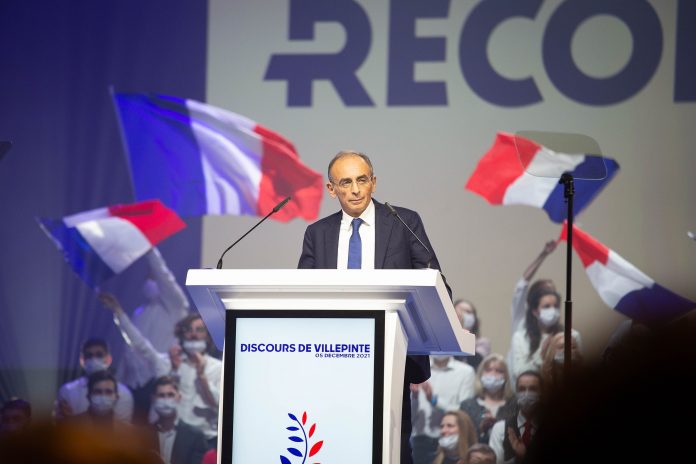The leaders of Germany, France, Poland, and the EU try to confront the new crisis in Ukraine by creating a united front. The goal is the de-escalation of the situation and to avoid a Russian invasion that could lead to an extended conflict. Despite differences of approach, the European leadership supports Ukraine’s integrity and considers the concentration of Russian troops in the vicinity of the Ukrainian borders a potential threat for the Eastern European country.
However, Russia has long-standing friends within the EU countries who support, in different ways, Moscow’s foreign policy. The European far-right and the new family of the ‘illiberal democrats’ are precious allies for Vladimir Putin.
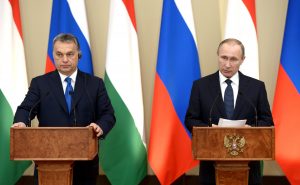
On the 1rst of February, the Hungarian Prime Minister Viktor Orbán met the Russian President in Moscow in the middle of the crisis. Orbán is not the only one who favours Putin’s politics. The European far-right still offers support in different forms to the Russian friend.
The French Marine Le Pen and Eric Zemmour, the German AfD, the Italian League, and others express skepticism for the Western actions. Some of them even openly support Putin’s political maneuvers.
EU far-right and the Ukrainian crisis of 2014
The relationship between the European far-right and Russia relies on several factors. The authoritarian regime of Putin offers an example for the European far-right parties, while Putin finds in them the perfect supporters of his foreign policy. The Ibiza scandal in Austria revealed that far-right parties expect a wide range of support from Russia. Several of these parties have received loans from Russian financial institutions, Russia’s disinformation services interfered in the European and national elections, and far-right politicians participate in conferences or media programs in Russia. The European far-right is the ideal vehicle to cause national or regional destabilization. The European parties support Russia’s interests at a national and European level (European Parliament).
This alliance that was described by Antonis Klapsis as an “unholy alliance” in his study “An Unholy Alliance. The European Far Right and Putin’s Russia”, was openly expressed on the ground of Ukraine.
The far-right parties in the European Parliament voted against the EU-Ukraine Agreement in 2014 while they supported the Crimean Annexation. These parties also opposed sanctions against Russia and called national governments to lift them.
Politicians of these parties went to Crimea during the orchestrated Moscow “referendum” as “independent” monitors. They all found the referendum perfectly and democratically organised.
The founder of the French National Front Jean-Marie Le Pen claimed in 2015 that France and Russia should save the “white world.” Marine Le Pen, leader of the party, and his daughter reacted immediately and expelled him. However, she is also tightly related to Putin. She has called sanctions against Russia “completely stupid,” and claimed that Crimea “has always been Russian.” Her party is also financially dependent on Russia taking loans from Russian financial institutions.
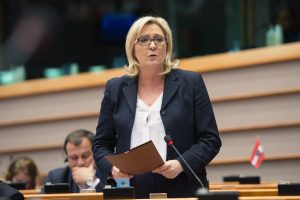
Marine Le Pen claimed that Crimea “has always been Russian.” [Credit: FLICKR/EUROPEAN PARLIAMENT/CC BY-NC-ND 2.0]
Matteo Salvini, the leader of the Italian League, also opposed sanctions against Russia and blamed NATO’s “aggressive” buildup in Eastern Europe.
Heinz-Christian Strache, the former leader of FPÖ and former Austrian Vice-Chancellor has frequently called the EU to lift sanctions against Russia. Strache also stated in 2015 that the aggressor in the regions is not Russia but NATO. He was involved in the Ibiza Scandal in 2019 that caused a major government crisis.
The German far-right party AfD has good relations with Russia. When AfD chief Bernd Lucke and three other AfD MEPs voted in favour of a European Council request for further sanctions against Russia in July 2014, Alexander Gauland, a leading member of the party, threatened to resign from his candidacy in the Brandenburg elections. In March, at a national party convention, he invited his colleagues to understand Putin’s actions on Crimea. Frauke Petry, who was the leader of the party in 2017, has met with Putin’s ruling party lawmakers in Moscow. The AFD describes the EU sanctions as a “farce.”
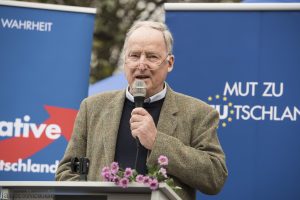
Alexander Gauland invited his colleagues to understand Putin’s actions on Crimea. [Credit: FLICKR/JAMES REA/CC BY-NC-ND 2.0]
More moderate, the Dutch far-right Geert Wilders, although condemning Russia for the shot down of the flight MH17 in 2014 and backing sanctions against the country, blamed “russophobia” during a Moscow visit in 2018. Wilders declares “a big fan of NATO and the Americans” but considers Russia an ally against migration and Islamic terrorism.
Putin’s political choices divide the European far-right
However, the actual crisis at the Ukrainian border is not a simple political confrontation between Russia and the West. The massive army mobilisation of Russian forces at a close distance from the Ukrainian border makes the risk of a military conflict visible.
Consequently, some of the far-right leaders consider their position in the light of their national political reality.
In France, there are two far-right candidates for the Presidential elections of 2022. Marine Le Pen of the Rassemblement national (RN) – the former National Front – and the newcomer Eric Zemmour. Le Pen was always in favour of close relations between France and Russia. For her, “Ukraine belongs to the sphere of influence of Russia”, as she told the Polish media Rzeczpospolita. She considers the support of the EU to Ukraine the reason for rising tensions.
“On the Ukrainian file, I want France to resume a role that it has always fulfilled in history, that of promoting de-escalation,” she tweeted on February 1.
Eric Zemmour expresses his sympathy for Putin openly. Before the visit of the French President Emmanuel Macron in Moscow, Zemmour underlined the lack of confidence of the Russian President in his French counterpart. In an interview, he stated that the revendications of Putin are ” completely legitimate”.
«It is not admissible to consider the entry of Ukraine into NATO,» twitted Zemmour.
In an important debate on Wednesday, January 12, 2022, in the Bundestag about foreign, European, and human rights policy, including the Russian troop deployment on the border with Ukraine, the AfD MP Petr Bystron directed his criticism against the Green Foreign Minister Annalena Baerbock accusing her of seeking confrontation with Russia.
In Italy, the leader of the League Salvini supports the dialogue with Putin and considers that Russia has many historical, cultural, and other reasons in this matter. For him, good relations between Italy and Russia are “fundamental”. Fratelli d’ Italia, the other far-right party in Italy, has a more moderate stance. Giorgia Meloni, the leader of FdI, recently declared that Russia has many common points with Europe while the “real danger” is China.
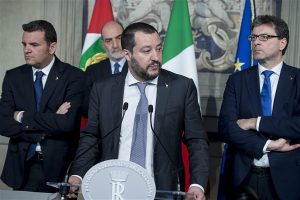
Matteo Salvini supports the dialogue with Putin. [Credit: PRESIDENZA DELLA REPUBBLICA]
The division between the far-right forces was made explicit during the summit organised in Madrid by VOX, on Saturday, February 5. It brought together the Prime Ministers of Hungary and Poland, Viktor Orbán and Mateusz Morawiecki, Marine Le Pen, and representatives of the League, FPÖ, and other parties.

